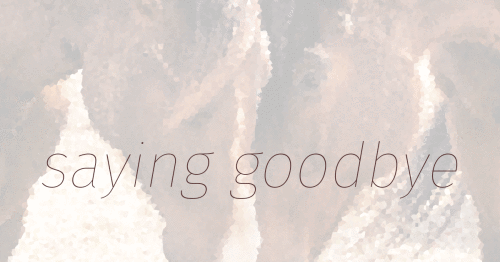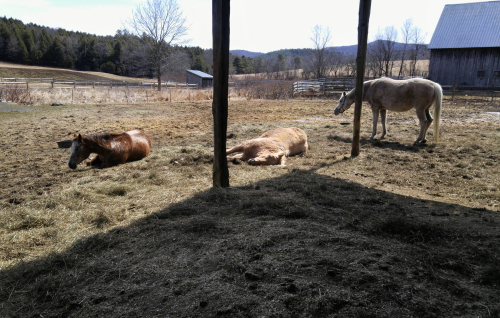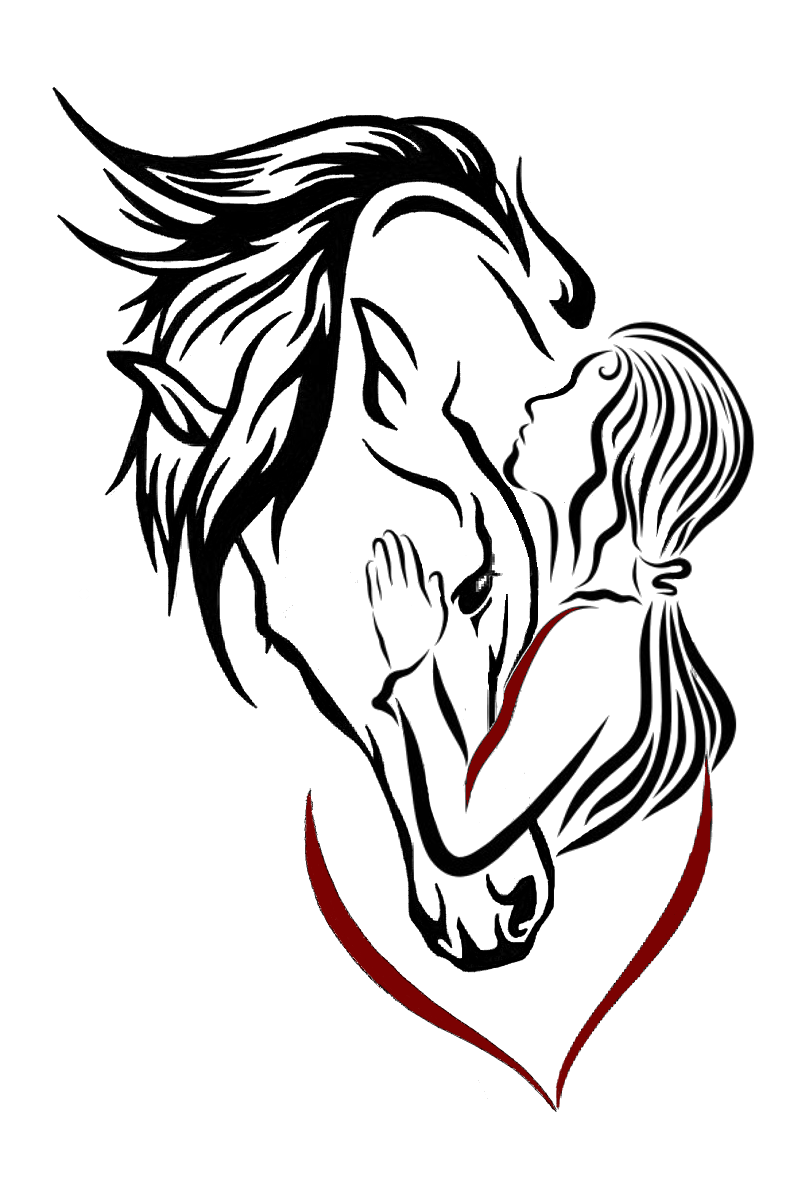How One Horse Says Goodbye to Another, and What We Can Learn


The Trafalgar Square Books offices are located on a Vermont farm. We recognize ourselves as pretty lucky, seeing as in between meetings and calls with authors we can look out the windows and see both horses and Highland Cattle grazing in the green fields that slope up from the barn where our books and DVDs are warehoused toward the treeline in the distance. There is something about seeing, hearing, and breathing horses throughout each work day that is integral to our mission of publishing books “for the good of the horse.”
A few equine members of the “TSB herd” are boarders, a few are training projects and in active work, and then there are a number of “retirees” that are allowed the freedom to roam, pretty much as they wish, in quiet companionship. The horses begin and end their days close to the barn, with paddocks and run-ins directly below our office windows, so we all form relationships of proximity with them—and we know their habits and rituals. We watch them eat breakfast and wander down to the stream for a drink. We see them play in the snow and nap in the sun. We notice how they relate to their pasturemates, the naughty pony, the cranky geese. We think of them all with affection, even though they are not ours to ride, train, or care for.
This past spring, we experienced a farm event that was profoundly moving; one that brought us all together, inspiring discussion and bringing questions to the fore that we had not yet dealt with directly as a collective group.
One morning, the barn manager arrived early in the morning to do chores and found one of the “old fellas,” a Quarter Horse gelding thought to be near 30 years old, in his pasture, unable to move and clearly in severe pain. The veterinarian was immediately called, and upon her arrival she determined the horse had broken his shoulder somehow during the night—a catastrophic accident without obvious cause. The decision was made to euthanize him without delay.
The gelding had long been turned out with two other pensioners, as had been arranged by a charitable owner. All three retirees had lived together contentedly as a small herd with little human interference for a number of years. As the veterinarian attended to the stricken gelding, one of his pasturemates startled her by coming over and lying down beside them, facing the injured horse, and remaining there as the old Quarter Horse took his last breaths. It was uncharacteristic of the companion to approach his pasturemate in such a fashion, and it was especially unusual, seeing as three people were present during the procedure.
The gelding’s owner wished to come say goodbye before his burial, so his body was not moved right away. Remarkably, the companion by his side remained, and when he did rise, it was only to change position before lying down beside his fallen comrade once again. The third horse in their little herd had also joined them, standing nearby, quietly, for quite some time.
The barn manager took a photograph of the scene, not to be macabre but to share what appears to us, at least by our human interpretation, to be the dead horse’s herd holding vigil over a friend’s body.

We are all horse people at Trafalgar Square Books, and as we are learning more about horses as sentient beings and the necessity of ensuring that compassion underlies all that we do with them, this incident moved us all distinctly. We discussed it with each other, and in relation to our own horses, and how the event might affect decisions we make on and around horses in the future. We also shared it with a number of our authors, asking for their thoughts and insight.
“Personally, I feel that we have gone to an extreme with our fear of ‘anthropomorphizing’ human behaviors onto animals,” said Dr. Allen Schoen, who recently co-authored THE COMPASSIONATE EQUESTRIAN with Susan Gordon. “The more we understand the commonality of neuroscience between species, especially mammalian species, the more we can appreciate that animals do grieve in their own way. I have seen this many times personally and have discussed this in my other books Love, Miracles and Animal Healing and Kindred Spirits. We see evidence of this in elephants and many other species. I have seen it in geese, sitting by the side of the road next to their mates who had been killed by a car. I feel it is time that we honor the sentience, the awareness, the consciousness of horses, and their awareness and sensitivity to the death of their companions, as well.”
“Horses use their entire bodies to communicate with each other,” explained Sharon Wilsie, co-author of HORSE SPEAK with Gretchen Vogel. “During the course of a day there are several primary conversations that they may have with each other when out in a herd. One of their favorite conversations is simply called, ‘sharing space.’ To our eyes horses who are sharing space together may seem to be doing nothing more than dozing in the sun or standing around doing nothing. However, once you understand the significance of sharing space you will begin to see the inherent bonding and peacefulness that they are participating in at that moment. When a herd member passes away, sharing space with the departed is the most affectionate and connecting conversation that the living can have, not only with the one who has passed away, but also with each other and inside themselves.
“Although we can only guess at what grief may feel like for a horse it is easy to feel the power of their hearts as they stand guard over the grave of a loved one. Those of us who have been around animals long enough will probably have experienced a horse lingering near the burial site of one who has crossed over that rainbow bridge. Unlike humans who can easily find distraction from our emotional pain, horses live in the present moment and experience the fullness of all of life, including the passing of another that might have been special to them.
“Living in the moment is not always easy for us,” says Sharon. “Perhaps that is why being with horses can feel so healing to our minds, hearts, and souls. Taking a page from their book of life may do us some good in facing what can be a very sad time for us. We, too, can mourn with the dignity, grace, and fullness that horses demonstrate so flawlessly.”
–Rebecca Didier, Senior Editor
<Original Article>
